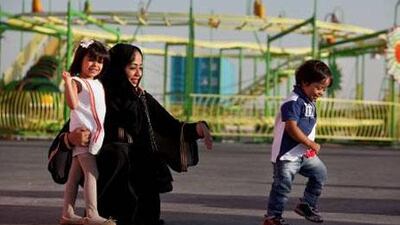DUBAI// Mohammed is treated like any other pupil at Inspire Children's Nursery. He knows his numbers and colours, lines up and waits his turn. Although the three-year-old Emirati has Down syndrome, his classmates do not seem to notice.
"I don't tell them he's different," said his teacher, Laudie Habib. "I just say he's special."
Mohammed is one of more than 100 children with disabilities or learning difficulties enrolled at nurseries across the UAE, partly the result of a Ministry of Social Affairs campaign called "We are all children".
Integrating special-needs children with their peers facilitates child development and prepares them for mainstream schools, said Jill England, an adviser for the Zayed Higher Organisation for Humanitarian Care and Special Needs, in Abu Dhabi.
The practice is particularly successful with young children, said Asma Maladwala, director of Mohammed's nursery, where about 15 per cent of students have special needs.
The Ministry of Social Affairs launched its campaign after receiving complaints in 2009 that nurseries would not accept children with special needs, said Moza Al Shoomi, head of the ministry's child department.
Searching for a nursery for Mohammed was "the worst nightmare", said his mother, Sarah Al Falasi, 28, from Dubai. "It was so difficult," Ms Al Falasi said. "You can see the fears in the teacher's eyes, so you don't want to go forward. Sometimes you can see the fears in the management's eyes, so you don't want to go forward."
She wanted Mohammed to attend an Arabic nursery, but was unable to find one where staff seemed comfortable about including her son, a friendly boy with black hair, light-up trainers and a wide smile.
Eventually she found an English nursery with help from the Dubai Early Childhood Development Centre, a programme for Emiratis run by the Community Development Authority. "Because I'm local it's easier, especially with having such a centre supporting me," Ms Al Falasi said. "But what if I'm not?"
Nurseries are not required to accept children with special needs.
"We don't want any nursery to take these children if they do not have qualified people," Ms Al Shoomi said. At one nursery, ministry inspectors found several special-needs children in a dark room with a nanny, separate from other children, she added. "We don't want that."
However, the ministry wants more nurseries to cater to the demographic. In 2010, the Minister of Social Affairs, Mariam Al Roumi, issued a decision encouraging nurseries to include children with seven categories of minor disabilities and developmental delays.
In a rating system the ministry is developing, nurseries will receive higher marks for catering for children with special needs.
Some are uncertain how to start. Kieny Watts, general manager of Hummingbird Early Learning Centre in Dubai, has been searching for 18 months for a teacher with special needs training. "I have parents coming in really begging, can you please accept my child, and I do feel sorry," Ms Watts said.
But nurseries are trying to address the issue, said Ms England, who teaches a training course on inclusion run by Arabian Child, an early childhood consultancy.
House of Colours Nursery in Al Ain has five students with special needs, and is creating a new programme for them.
Future Stars Nursery in Abu Dhabi does not take "severe cases" but considers children with speech delays, physical handicaps, mild autism or other conditions, said Christine Shaheen, a nursery administrator. "Very often they really do improve a lot after being around children singing, repeating and all of the things we do in the classroom," she said.
Since Mohammed enrolled at Inspire in September, Ms Al Falasi has seen a "huge difference" in her son.
"He started talking, he is eating alone," she said. "I can leave him in the play area and just go. I can trust he is safe, he can manage."
His teacher will sometimes modify activities for him, but mostly he is treated the same.
"He's very independent, you can see," Ms Habib said.
On Monday, while teachers coaxed other children to eat their lunch, Mohammed ate on his own. "Finished." he said, holding out his juicebox. Then he walked over to a classmate and playfully roared, opening his mouth wide. His friend turned and roared back.

